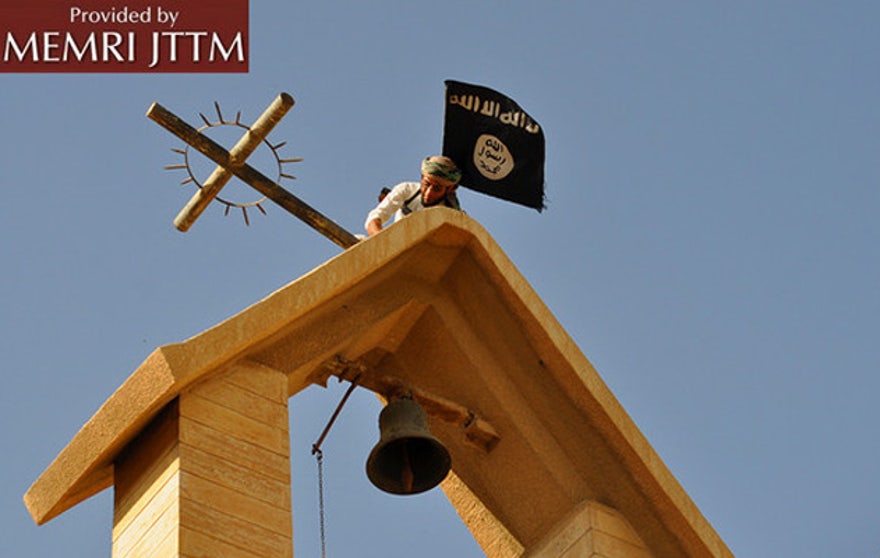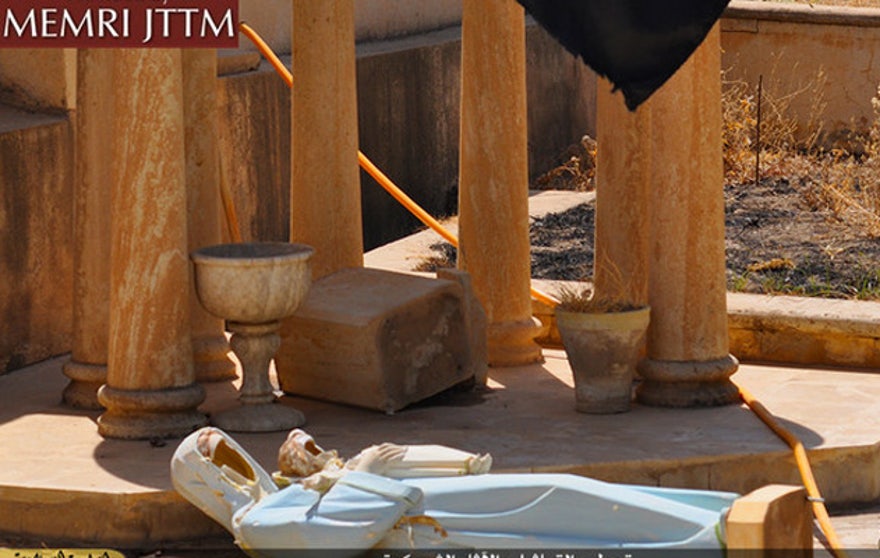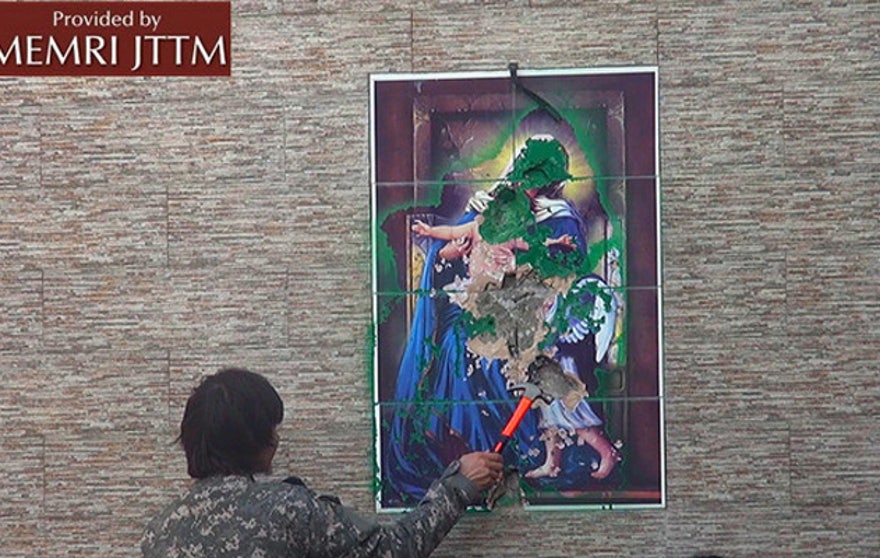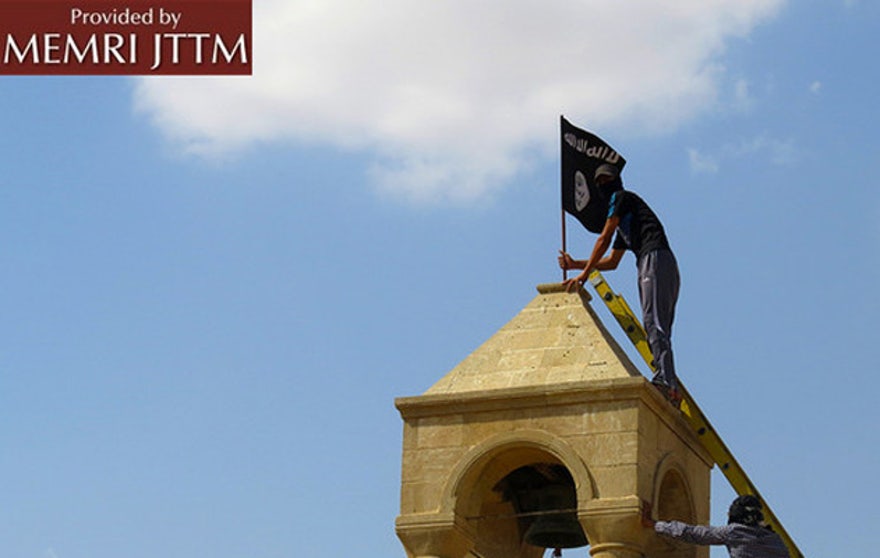ISIS’ dark agenda: Terror group’s tweets show more destruction of sacred Christian sites
Chilling new images released Monday show ISIS thugs advancing the Islamist army’s dark agenda of eradicating Christianity from Iraq by smashing crosses, toppling statues and destroying sacred relics that have been in place for thousands of years.
The latest batch of photos, culled from the Internet by watchdog Middle East Media Research Institute, show ISIS members in the heart of Iraq’s once-thriving Assyrian Christian community of Nineveh, destroying symbols the Islamist terror group considers polytheistic and idolatrous. The images show the men removing crosses from atop churches and replacing them with the black ISIS banner, destroying crosses at other locations such as atop doorways and gravestones, and destroying icons and statues inside and outside churches. The sickening images are just the latest evidence of ISIS’ ongoing effort to cleanse its so-called caliphate of its Christian heritage.
“They don’t care what it’s called; they are just following their ideology and that means getting rid of churches and minorities,” said MEMRI Executive Director Steven Stalinsky. “It is the Islamic State, and there’s no room for anyone else.
“This has been going on for some time, a systematic campaign to rid the region” of any vestiges of Christianity.
Although the United Nations has condemned the acts, Islamic State, as ISIS is also known, has enthusiastically circulated photos of its fighters destroying the sacred symbols and relics.
“We cannot remain silent,” Irina Bokova, head of the United Nations Educational, Scientific and Cultural Organization, said Friday. “The deliberate destruction of cultural heritage constitutes a war crime. I call on all political and religious leaders in the region to stand up and remind everyone that there is absolutely no political or religious justification for the destruction of humanity’s cultural heritage.”
Bokova spoke after ISIS reportedly used heavy equipment to demolish the site of the ancient Assyrian capital of Nimrud, 18 miles south of Mosul, Iraq’s second-largest city. Statues, tablets and other relics have been taken from churches and destroyed or possibly sold on the black market. While the humanitarian crisis facing Iraq’s Christian community is of paramount concern, religious leaders also lament the loss of the religion’s most ancient artifacts.
In Iraq, Chaldean Catholic Patriarch Louis Sako last week called on the central government and the international community “to act as soon as possible for the protection of innocent civilians and to offer them the necessary assistance in lodging, food and medication.”
ISIS “is burning everything: human beings, stones and civilization,” he said in a March 9 statement.
Sako said thousands of families have been displaced by the fighting, and he called for an emergency meeting of Iraq’s Council of Ministers and the National Assembly deputies “to discuss this situation that threatens to deteriorate from bad to worse.”
“This is obviously a human catastrophe that cannot suffer any silence,” he said.
Nimrud, built more than 3,000 years ago, was the capital of the Neo-Assyrian Empire after 883 B.C. The Neo-Assyrian Empire, whose rulers spoke a language distantly related to Arabic and Hebrew, ruled Mesopotamia, the ancient name for Iraq and parts of Syria, until approximately 600 B.C. For centuries, the region along the Tigris River retained monuments, frescos, temples and a ziggurat, the stepped pyramid characteristic of Mesopotamian civilizations.
But earlier this month, ISIS released video showing men smashing statues with sledgehammers in the Nineveh Museum, in Nineveh, the capital of the Neo-Assyrian Empire after 705 B.C.
In recent weeks, ISIS has also set off bombs around Mosul Central Library, destroying as many as 10,000 priceless and irreplaceable books and manuscripts.
Many relics have been taken to museums in Baghdad or around the world for safekeeping, but artifacts in churches, including murals and statues, have been left where they stood for millennia, until the rise one year ago of the black-clad terrorist army. Last summer, ISIS fighters used explosives to blow up the tomb of a key figure in Christianity, Judaism and Islam. The holy site in Mosul was believed to be the burial place of the prophet Jonah, who was swallowed by a whale in the Islamic and Judeo-Christian traditions.
The mob beat them and broke their legs so they would not be able to flee. “They picked them up by their arms and legs and held them over the brick furnace until their clothes caught fire. And then they threw them inside the furnace.” — Javed Maseeh, family spokesman, to NBC News.
The attack was not an isolated one. Rather it seems to be part of systematic killings, community by community.
Imagine you are a person of Christian faith living as a citizen in the Islamic Republic of Pakistan: every moment your life is at risk. Imagine a Pakistani Muslim shouting that you have burned a page of holy Quran when you have not; or accusing you of having desecrated the Prophet Mohammed: you have hardly any chance of saving yourself. There would be no question of providing evidence or proof against you. You would be killed either by the mob or by the country’s legal system.
If you were one of the 3% minority Christians of Pakistan, you would fear for your life every moment among the majority Muslims; any one of them could shout and point at you as the Nazi collaborators did during the Second World War against the Jews. You inevitably would be beaten to death by your fellow countrymen.
This month in Pakistan, a Christian couple and their unborn child were burned to death, because of a false accusation of burning pages of a Quran.
Christians riot in Pakistan after attacks targeting churches kill 14
ISLAMABAD, Pakistan — Members of the Christian community rampaged through the streets of Lahore on Sunday after suicide bombers attacked two churches during morning services, killing at least 14 people and wounding more than 70.
The Pakistani Taliban took credit for the attacks, reviving concerns that the Islamist militant group will increasingly target religious minorities in a bid to further divide Pakistanis and distract them from ongoing military operations against extremists.




